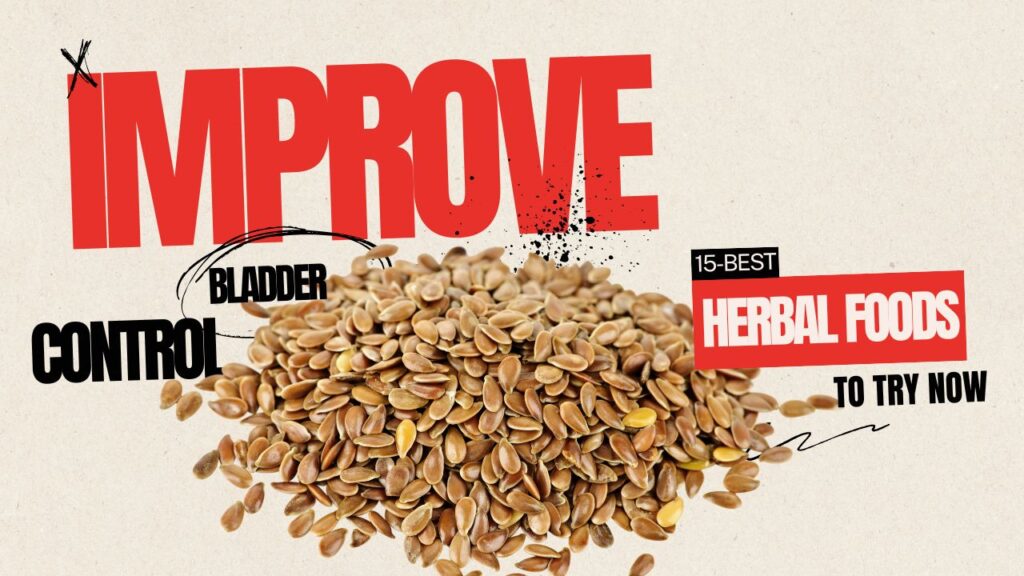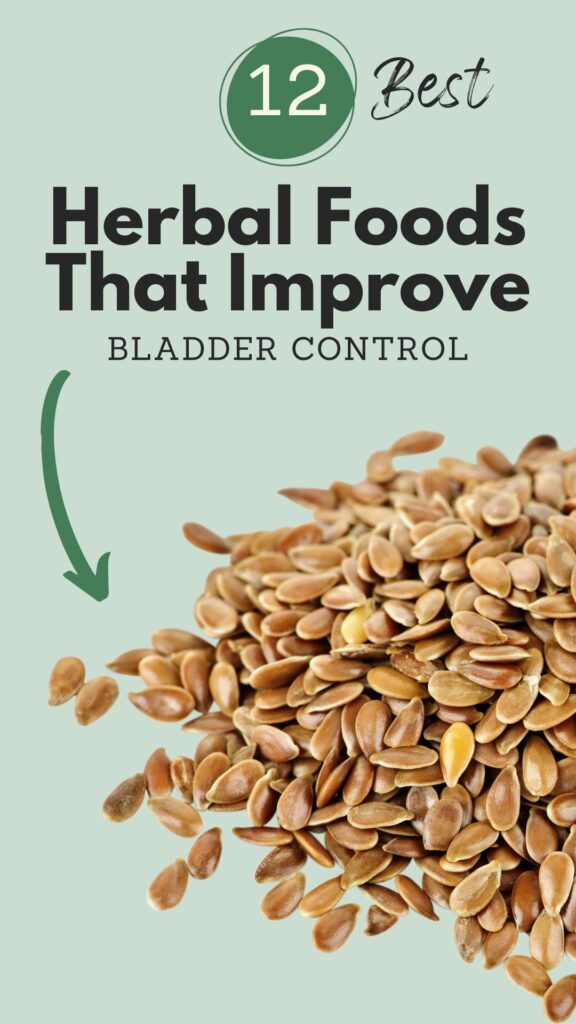Some links in this blog are affiliate links. If you make a purchase through these links, I may receive a small commission. This helps support the site at no extra cost to you.
Do you know that nearly one in three adults experiences bladder control issues at some point in their life? From frequent urination to sudden urges, poor bladder control can significantly affect daily comfort and confidence.
While medical treatments exist, nature also provides a range of herbal foods that help strengthen bladder function, reduce irritation, and improve urinary balance.
Bladder problems are often linked to weak pelvic muscles, infections, or dietary triggers. Interestingly, many herbs and plant-based foods have been used for centuries in traditional medicine to soothe the urinary tract, reduce inflammation, and support bladder health.
These natural options can easily be incorporated into your diet, offering gentle yet effective support without relying solely on medications.
In this article, we’ll explore 12 powerful herbal foods that improve bladder control, how you can include them in your meals, who should consider them, and tips for buying, storing, and consuming them safely.

Table of Contents

12 Best Herbal Foods To Support Bladder Control
1. Pumpkin Seeds
Pumpkin seeds are rich in zinc and magnesium, both of which support bladder muscle strength and reduce overactive bladder symptoms. They also contain plant compounds called phytoestrogens, which may help balance hormones affecting bladder function, especially in women.
Best Ways to Eat or Use It
- Sprinkle raw or roasted seeds on salads and soups.
- Add to smoothies or homemade granola.
- Use pumpkin seed oil in salad dressings.
Who Should Eat / Avoid
- Good for: Women experiencing post-menopausal bladder issues, men with prostate concerns.
- Avoid if: You have seed allergies or struggle with high-calorie snacks.
Storage & Buying Tips
- Choose unsalted, raw, or lightly roasted seeds.
- Store in an airtight container in a cool, dry place.
Do’s & Don’ts
✅ Do: Pair with yogurt or oats for a nutrient-rich snack.
❌ Don’t: Overeat, as they are calorie-dense.
Possible Side Effects
- May cause digestive discomfort if consumed in very large amounts.
2. Horsetail Herb
A traditional remedy, horsetail has natural diuretic properties and helps tone bladder muscles, reducing urinary leakage.
Best Ways to Eat or Use It
- Brew as herbal tea.
- Available as tinctures or capsules.
Who Should Eat / Avoid
- Good for: People with mild urinary incontinence.
- Avoid if: Pregnant or breastfeeding, or if you have kidney problems.
Storage & Buying Tips
- Buy dried horsetail herb from trusted herbal stores.
- Store in a sealed jar away from sunlight.
Do’s & Don’ts
✅ Do: Drink in moderation, 2–3 times per week.
❌ Don’t: Use long-term without medical advice.
Possible Side Effects
- Excessive use can cause thiamine (Vitamin B1) deficiency.
3. Cranberries
Cranberries are famous for their role in preventing urinary tract infections (UTIs). They help reduce bacteria from sticking to the bladder walls, which indirectly improves bladder control.
Best Ways to Eat or Use It
- Fresh cranberries in smoothies.
- Unsweetened cranberry juice.
- Dried cranberries in moderation.
Who Should Eat / Avoid
- Good for: People prone to UTIs.
- Avoid if: You’re on blood-thinning medication (cranberries may interact).
Storage & Buying Tips
- Buy unsweetened juice for maximum benefit.
- Store fresh cranberries in the refrigerator.
Do’s & Don’ts
✅ Do: Combine with probiotic-rich yogurt.
❌ Don’t: Choose sugar-loaded cranberry juices.
Possible Side Effects
- High intake can upset the stomach.
4. Gosha-jinki-gan (Traditional Japanese Herbal Blend)
This herbal formula contains 10 medicinal plants and is well-studied for overactive bladder symptoms. Research shows it helps reduce urinary urgency and frequency.
Best Ways to Eat or Use It
- Typically available as capsules or teas.
Who Should Eat / Avoid
- Good for: People with frequent urination.
- Avoid if: You’re pregnant or on multiple medications.
Storage & Buying Tips
- Buy from authentic, licensed herbal stores.
Do’s & Don’ts
✅ Do: Follow dosage instructions strictly.
❌ Don’t: Self-medicate without professional advice.
Possible Side Effects
- Mild digestive upset in some individuals.
5. Flaxseeds
Flaxseeds are rich in omega-3 fatty acids and lignans, which help reduce bladder inflammation and irritation. They also aid bowel regularity, which supports overall pelvic health.
Best Ways to Eat or Use It
- Add ground flaxseeds to oatmeal or smoothies.
- Mix into baked goods.
Who Should Eat / Avoid
- Good for: Women with hormonal imbalances.
- Avoid if: You have digestive sensitivity to high fiber.
Storage & Buying Tips
- Store ground flaxseeds in the refrigerator.
- Buy whole seeds and grind at home for freshness.
Do’s & Don’ts
✅ Do: Soak before adding to smoothies.
❌ Don’t: Store ground seeds at room temperature.
Possible Side Effects
- Overconsumption may cause bloating or gas.
6. Corn Silk
An ancient herbal remedy, corn silk (the silky threads from corn husks) has soothing properties for the urinary tract and helps relieve bladder irritation.
Best Ways to Eat or Use It
- Brew into a light herbal tea.
Who Should Eat / Avoid
- Good for: People with frequent urination or mild infections.
- Avoid if: You’re allergic to corn.
Storage & Buying Tips
- Use fresh silk or dried varieties sold in herbal shops.
Do’s & Don’ts
✅ Do: Drink 1–2 cups per day.
❌ Don’t: Replace medical treatment for severe infections.
Possible Side Effects
- May lower potassium levels if overused.
7. Turmeric
Turmeric’s anti-inflammatory properties help reduce bladder irritation and support urinary tract health.
Best Ways to Eat or Use It
- Add fresh turmeric to curries or teas.
- Mix with warm milk for golden milk.
Who Should Eat / Avoid
- Good for: People with bladder inflammation or infections.
- Avoid if: You’re on blood-thinning medication.
Storage & Buying Tips
- Choose organic turmeric root or high-quality powder.
Do’s & Don’ts
✅ Do: Pair with black pepper for better absorption.
❌ Don’t: Take excessive turmeric supplements.
Possible Side Effects
- High doses may upset the stomach.
8. Parsley
Parsley is a natural diuretic that helps flush out bacteria and improve bladder efficiency.
Best Ways to Eat or Use It
- Fresh parsley in salads, soups, or teas.
Who Should Eat / Avoid
- Good for: General urinary health.
- Avoid if: You’re pregnant (in high doses).
Storage & Buying Tips
- Store fresh parsley wrapped in a damp towel inside the refrigerator.
Do’s & Don’ts
✅ Do: Use fresh leaves for maximum benefit.
❌ Don’t: Rely on dried parsley alone.
Possible Side Effects
- Can cause mild bloating in some individuals.
9. Chamomile
Chamomile tea has antispasmodic properties that relax the bladder and reduce urgency.
Best Ways to Eat or Use It
- Drink as herbal tea before bedtime.
Who Should Eat / Avoid
- Good for: Stress-related bladder issues.
- Avoid if: Allergic to ragweed.
Storage & Buying Tips
- Buy organic, dried chamomile flowers.
Do’s & Don’ts
✅ Do: Drink 1–2 cups daily for relaxation.
❌ Don’t: Combine with sedatives without medical advice.
Possible Side Effects
- May cause drowsiness in some people.
10. Ginger
Ginger improves blood circulation and reduces bladder irritation caused by infections.
Best Ways to Eat or Use It
- Fresh ginger tea.
- Add to stir-fries and soups.
Who Should Eat / Avoid
- Good for: People with chronic inflammation.
- Avoid if: You have gallstones or are on blood thinners.
Storage & Buying Tips
- Store fresh ginger in the refrigerator.
Do’s & Don’ts
✅ Do: Use fresh ginger for teas.
❌ Don’t: Consume excessively in supplements.
Possible Side Effects
- May cause heartburn in sensitive individuals.
11. Dandelion Root
A natural bladder tonic, dandelion root tea supports detoxification and reduces water retention.
Best Ways to Eat or Use It
- Brew into tea.
- Use dried root in capsules.
Who Should Eat / Avoid
- Good for: Mild bladder weakness.
- Avoid if: You have gallbladder issues.
Storage & Buying Tips
- Store dried root in airtight jars.
Do’s & Don’ts
✅ Do: Use fresh roots when possible.
❌ Don’t: Rely solely on supplements.
Possible Side Effects
- May increase urination frequency.
12. Saw Palmetto
Saw palmetto is known for supporting prostate and bladder health, especially in men.
Best Ways to Eat or Use It
- Typically consumed as capsules or tea.
Who Should Eat / Avoid
- Good for: Men with prostate-related bladder issues.
- Avoid if: Pregnant, breastfeeding, or on hormone therapy.
Storage & Buying Tips
- Choose standardized extracts.
Do’s & Don’ts
✅ Do: Consult a healthcare provider before use.
❌ Don’t: Take in high doses.
Possible Side Effects
- May cause mild dizziness or headache.
Conclusion
Bladder health is often overlooked, yet it plays a critical role in our daily comfort and confidence. By incorporating these 12 herbal foods—from pumpkin seeds and cranberries to parsley and saw palmetto—you can naturally strengthen your bladder, reduce irritation, and improve control.
Each herb comes with unique benefits, so experimenting with different options may help you discover what works best for your body. Remember to enjoy them in moderation, store them correctly, and pay attention to how your body responds.
If bladder problems persist, always consult a healthcare professional. But in the meantime, you can start today by adding one of these herbs to your next meal or tea.
Which herbal food have you tried for bladder health? Share your favorite recipes or remedies in the comments!
Frequently Asked Questions (FAQs)
Can herbal foods really improve bladder control?
Yes. Many herbs like pumpkin seeds, parsley, and chamomile have natural compounds that strengthen bladder muscles, reduce irritation, and support urinary tract health. However, results may vary depending on the individual and the underlying cause of bladder issues.
How long does it take to see results from these herbal foods?
Some people may notice improvements within a few weeks of consistent consumption, while for others it might take a few months. Since these are natural remedies, patience and regular use are key.
Are these herbal foods safe for everyone?
Most are safe when eaten in moderate amounts. However, people with specific medical conditions (e.g., kidney disease, gallstones, or those on blood thinners) should consult a doctor before adding certain herbs like turmeric, ginger, or saw palmetto to their diet.
Can I take supplements instead of eating the foods directly?
Yes, many herbs such as saw palmetto, horsetail, and dandelion root are available as supplements. Still, it’s best to get nutrients from whole foods when possible, and supplements should be taken only under professional guidance.
Do cranberries really help with bladder problems?
Cranberries are especially helpful in preventing urinary tract infections (UTIs). They stop bacteria from sticking to the bladder walls, which indirectly improves bladder health and reduces irritation.
Are there any side effects of these herbal foods?
Most are safe in moderation, but overuse can cause issues like stomach upset (turmeric, ginger), digestive discomfort (flaxseeds, pumpkin seeds), or interactions with medications (cranberries, saw palmetto). Always listen to your body and avoid excess intake.
Should I avoid caffeine if I have bladder control problems?
Yes. Caffeine in coffee, tea, and energy drinks can irritate the bladder and worsen urgency or leakage. Opting for herbal teas like chamomile or corn silk can be a gentler alternative.
Who benefits the most from these herbal foods?
They can benefit older adults, women after childbirth or menopause, men with prostate-related bladder issues, and anyone experiencing mild incontinence or frequent urination.
Can children eat these herbal foods for bladder support?
Some bladder-friendly foods like flaxseeds and pumpkin seeds are safe for children in small amounts. However, concentrated herbal teas or supplements should only be used under pediatric guidance.
Should these foods replace medical treatment for bladder issues?
No. While herbal foods can provide natural support, they should not replace prescribed medical treatments for serious bladder conditions. They work best as complementary dietary additions.










